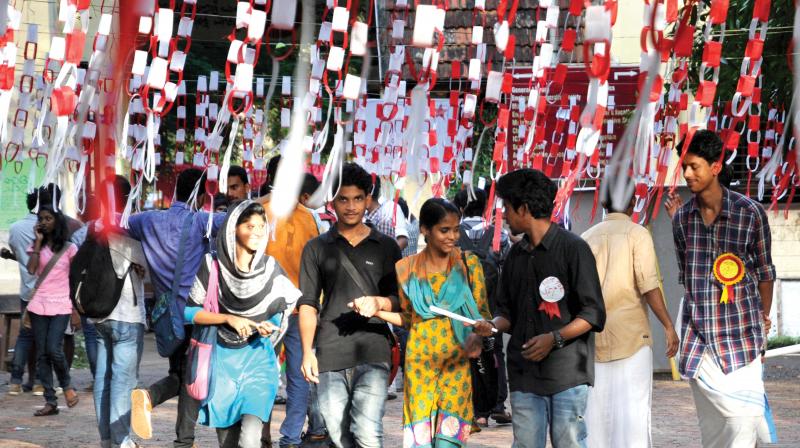Student politics: Beyond ban

It has been just over a week since the Kerala government announced its intention to bring in a piece of legislation to facilitate student organisational activities at educational institutions. This was a relief for student organisations, which had to buck under the pressure of the 2017 Kerala High Court Divisional Bench observation that students indulging in political activities at educational institutions could be expelled. But close to the heels of the government announcement, a college student was murdered on his campus in Kochi on Sunday night over an alleged political tiff.
Kerala, known for the political consciousness of its people and vibrant campus atmosphere, has produced several inspiring leaders. Debates, discussions and opinions are strong everywhere on campuses, from canteens to hostels and streets. But over the years, has politics taken a violent turn? “It sadly has,” says Safiyuddin, a B.Arch student at NIT, Calicut. “Students have no enmity against each other. What I understand is that the involvement of persons outside the campus triggers violence,” he feels.
Since the ban, there has been no political activity on his campus. “We conduct elections every year, but there is no political backing and hence there are mostly single nominations. That’s good for us because our courses get completed on time and our classes are never disrupted,” he says, citing the examples of his friends who are studying in colleges in Wayanad and Kozhikode, who are lagging behind in academics due to frequent strike calls and fights on their campuses. But not everyone thinks that ‘ban’ is the right tool for ‘cleansing’ campuses. “Politics is essential in campuses as it is very much related to the survival of students by reacting to injustice,” opines Sheema T.V.M., a student of Zamorin’s Guruvayurappan College, Kozhikode.
The term ‘politics-free campus’, she says, is a trap. “The last victim of ‘politics-free campus’ was Jishnu Pranoy, the student who was found hanging in the bathroom of his college hostel after undergoing brutal physical and mental harassment at the hands of his college management. So ‘politics-free’ is a dangerous trap. A student’s learning should not be limited to the syllabus. People who question injustice have, at all times, been in continuous conflict with the establishment. So the question of a ban on politics itself is irrelevant,” says Sheema.
The elimination of politics on campuses results in the birth of a new apolitical generation. “There will be no space for secular and democratic thoughts and ideology in such campuses. Communalism will creep in and murders will be an everyday tale in such a scenario,” says Akshara S. Raj, a postgraduate student at the Central University of Kerala in Kasaragod. “The answer to crime is not an apolitical campus, but politics itself,” she adds. Agrees Navami Ramachandran, a first-year graduation student at Government Law College, Ernakulam, “When we lose creative politics on campuses, we are offering space for the politics of hatred, resulting in brilliant students like Abhimanyu (who was killed on Sunday) falling prey to communalism and political violence.”
Violence, however, is not something that flares up among students. “There are always outside influences behind violent incidents on campus,” says a student of the Cochin University of Science and Technology, who prefers anonymity. “Recently, a spat between two people over eve-teasing triggered a set of ugly events on our campus. The two political parties were quick to take sides and what started as a verbal duel ended up in stone-pelting. Finally, police arrived at the scene, but the violent students pelted stones at them and two cops were injured. The situation soon turned out of control and the mob destroyed the vehicles parked on the campus. Something that could be settled amicably snowballed into a huge issue only because of political involvement,” he says.
Outside Kerala, it’s different. Aamshir Fayas, a second-year student at NIFT, Jodhpur, where student organisations are unheard of, says that politics is necessary for students’ welfare. “To fight for our rights and welfare measures, students need to be politically aware. But the moment it turns out to be a ‘show of strength’, both in terms of number and muscle power, it’s better that politics is banned on campuses. I don’t think many who fight in the name of politics can even recognise their party’s symbol,” he says. The arguments are many. While some feel politics results in crime, others say one can’t run away from it always as some day, one has to take a political stance – because it’s a democratic country!
(Inputs from Akhil K.M.)

